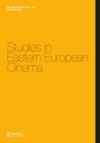太多的手:捷克无声民族史诗Svatý Václav的官僚主义编剧(圣瓦茨拉夫)(1930)
IF 0.4
0 FILM, RADIO, TELEVISION
引用次数: 0
摘要
本文考察了捷克在-à-vis国家资助电影院的编剧实践。它侧重于无声的民族史诗戏剧圣瓦茨拉夫(Svatý Václav, 1930),并阐明了官僚干预的形式在整个正式写作过程。本文借鉴麦克唐纳的屏风观念和屏风观念工作组的概念,试图解释一种集体动力,并处理正史问题。我认为,学者们经常改变屏幕的概念,以适应他们的历史解释。由于这是由于他们在集体中的突出地位,本文研究了决策过程中的权力等级以及合作、竞争和谈判的形式。在此过程中,通过解释编剧大赛评审团的功能和监管声音划定文本边界的影响,有助于我们重新思考编剧实践。然后,列出的编剧的解决方案说明了在限制范围内讲述众所周知的故事的创造力和艺术野心的务实减少。本文章由计算机程序翻译,如有差异,请以英文原文为准。
Too many hands: a bureaucratic screenwriting for the Czech silent national epic Svatý Václav (St. Wenceslas) (1930)
Abstract This article examines the Czech screenwriting practice vis-à-vis state-subsidised cinema. It focuses on the silent national epic drama St. Wenceslas (Svatý Václav, 1930) and sheds light on the forms of bureaucratic interventions throughout the formalised writing process. Drawing on Ian W. Macdonald’s concepts of screen idea and screen idea work group, the paper seeks to explain a collective dynamic and deals with the official historiography issue. I argue that academics had frequently altered the screen idea to suit their historical interpretation. Since this was enabled by their prominence in the collective, the article examines the hierarchy of power in the decision-making process and the forms of collaboration, competition and negotiation. In so doing, it helps us to rethink the screenwriting practice by explaining the functions of the screenwriting contest jury and the impact of supervisory voices delineating textual boundaries. The outlined screenwriters’ solutions then illustrate both the creativity in telling the well-known story within the limits and the pragmatic decrease in artistic ambitions.
求助全文
通过发布文献求助,成功后即可免费获取论文全文。
去求助
来源期刊

Studies in Eastern European Cinema
Arts and Humanities-Visual Arts and Performing Arts
CiteScore
0.50
自引率
0.00%
发文量
34
 求助内容:
求助内容: 应助结果提醒方式:
应助结果提醒方式:


